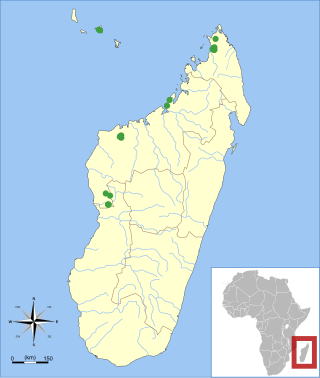The African long-fingered bat is a species of vesper bat in the family Miniopteridae. It is found only in Kenya. It is found in subtropical or tropical moist montane forests. This species is often considered a synonym of Miniopterus inflatus. The holotype was collected in October 1926 by A. M. Bailey. It was described as a new species in 1936 by Colin Campbell Sanborn.
The lesser long-fingered bat, also known as the black clinging bat or lesser bent-winged bat, is a species of vesper bat in the family Miniopteridae. It is found in western Southern Africa, south East Africa, and parts of Central Africa. Its natural habitats are temperate forests, temperate shrubland, and caves and other subterranean habitats.

Glen's long-fingered bat is a species of vesper bat in the family Miniopteridae found only in Madagascar.

The greater long-fingered bat is a species in the family Miniopteridae. It is found in Cameroon, Central African Republic, Democratic Republic of the Congo, Equatorial Guinea, Ethiopia, Gabon, Guinea, Kenya, Liberia, Mozambique, Namibia, Rwanda, Tanzania, Uganda, and Zimbabwe. It roosts in caves. The long-fingered bats diet consists of trawling fish. This species is one of three bat species known to catch fish.

Major's long-fingered bat is a species of vesper bat in the family Miniopteridae. It is found only in Madagascar. It is similar to M. schreibersi of continental Africa, differing by having a shorter forearm, slightly longer digits and a narrow box-shaped skull. The pelage is often a greyish-brown colour, and the tragus is kidney-shaped and is a prominent feature. It is an insectivore and is viewed as a possible contributor to pest removal in Madagascar. The species was named in honour of Swiss zoologist C. I. Forsyth Major.

The Manavi long-fingered bat is a bat in the genus Miniopterus that occurs in east-central Madagascar. First described in 1906, this species was later included in the mainland African M. minor. A 1995 revision united populations of small Miniopterus from Madagascar and the Comoros as M. manavi, but molecular and morphological studies in 2008 and 2009 showed that this concept of M. manavi in fact included five different species. M. manavi itself was restricted to a few locations in the eastern Central Highlands and populations in the Comoros and northern and western Madagascar were allocated to different species.

The Natal long-fingered bat is a species of vesper bat in the family Miniopteridae. It can be found in Angola, Botswana, Democratic Republic of the Congo, possibly Eswatini, Ethiopia, Kenya, Lesotho, Malawi, Mozambique, Namibia, South Africa, South Sudan, Tanzania, Uganda, Zambia, and Zimbabwe. It is found in dry savanna, moist savanna, Mediterranean-type shrubby vegetation, caves, and hot deserts.

The small bent-winged bat is a species of vesper bat in the family Miniopteridae. A novel version of coronavirus has been identified in this species. It can be found in Bangladesh, Bhutan, India, Indonesia, Laos, Malaysia, Nepal, Philippines, Thailand and Vietnam.

The common bent-wing bat, also known as the Schreibers's long-fingered bat or Schreibers's bat, is a species of insectivorous bat. They appear to have dispersed from a subtropical origin and distributed throughout the southern Palearctic, Ethiopic, Oriental, and Australian regions. In Europe, it is present in the southern half on the continent from Iberia to the Caucasus, with the largest populations found in the warmer Mediterranean area. The common and scientific names honor Carl Franz Anton Ritter von Schreibers.

Miniopterus, known as the bent-winged or long winged bats, is the sole genus of the family Miniopteridae. They are small flying insectivorous mammals, micro-bats of the order Chiroptera, with wings over twice the length of the body. The genus had been placed in its own subfamily among the vespertilionid bats, as Miniopterinae, but is now classified as its own family.

Miniopterus aelleni is a bat in the genus Miniopterus that occurs on Anjouan in the Comoros and in northern and western Madagascar.

Miniopterus griveaudi is a bat in the genus Miniopterus found on Grande Comore and Anjouan in the Comoros and in northern and western Madagascar. First described in 1959 from Grande Comore as a subspecies of the mainland African M. minor, it was later placed with the Malagasy M. manavi. However, morphological and molecular studies published in 2008 and 2009 indicated that M. manavi as then defined contained five distinct, unrelated species, and M. griveaudi was redefined as a species occurring on both Madagascar and the Comoros.

The Australasian bent-wing bat is a species of vesper bat in the family Miniopteridae. It is found in Australia and in Southeast Asia.
Miniopterus newtoni is a species of bat that is endemic to São Tomé and Príncipe.
Miniopterus maghrebensis, also known as the Maghrebian bent-wing bat, is a species of bat found in North Africa.
The sandy long-fingered bat, also known as the sandy bent-winged bat, is a species of bat from the genus Miniopterus that is endemic to the Arabian Peninsula and East Africa. The species was initially described as a subspecies of either M. schreibersii or M. natalensis. Recent genetic research has revealed that specimens from the Arabian Peninsula and Ethiopia, which were tentatively ascribed to the genus, are significantly distinct from M. schreibersii and M. natalensis. A genetic analysis of type locality material is still needed before taxonomy can be resolved.
The Javanese long-fingered bat is a species of bat from the Miniopterus genus native to Indonesia. A common misconception was that Miniopterus blepotis belonged to the M. schreibersii subspecies. M. blepotis was recognized as a distinct species after the Schreibersii complex was divided. This is backed up by New Guinean mtDNA sequence data that is ascribed to M. blepotis. Whether it is a complex made up of multiple species is unknown.











